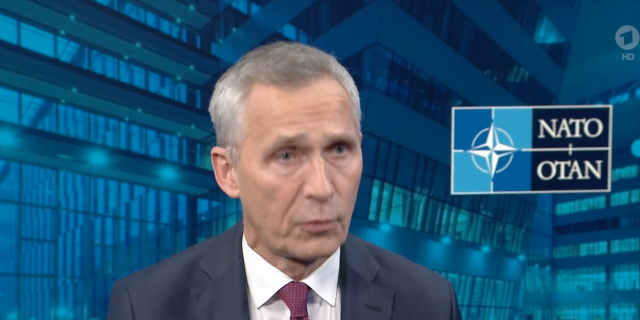NATO Secretary General Stoltenberg: we should prepare for bad news from Ukraine
In an interview for German broadcaster ARD, NATO Secretary General Stoltenberg said that Ukraine is in a "critical situation" and things could get even worse due to insufficient assistance from the West. The fact is that NATO members have not been able to meet Kiev's increased demand for ammunition.
Presenter of the program "News of the day" (Tagesschau):
20 months after the start of the Russian special operation in Ukraine, the situation at the front looks critical for Ukraine. An attempt to oust Russian troops from their territory with the help of a counteroffensive failed. The consequence of this failure was a positional war of attrition, which could play into Russia's hands.
Such warfare requires a large amount of ammunition. In this regard, NATO Secretary General Stoltenberg criticizes the European arms production policy. "We have not been able to cooperate as closely as is required of us," Stoltenberg said in an exclusive interview with Studio ARD in Brussels. Now this is a crucial task — to accelerate and increase the production of weapons. Here is the full interview of the Secretary General.
ARD (head of the bureau of the TV channel in Brussels, Markus Preiss): How do you assess the situation at the front?
Stoltenberg: I am always careful in my assessments of the current situation at the front. Wars are inherently unpredictable. Only one thing is for sure: the more we support Ukraine, the sooner this war can end.
ARD: But if we listen to the commander of the Ukrainian troops, Valery Zaluzhny, then this is what he says: there is a stalemate, a decisive breakthrough cannot be achieved. Wouldn't the following tactic be reasonable for Putin in this situation: just wait, because he believes that, unlike the West, he has "enough breath" to fight for a long time? Just wait until the course of events turns in his favor?
Stoltenberg: It is our common task to prove the opposite to Putin. We must clearly understand that for Ukraine, a victory by President Putin would be a tragedy. But such a victory would be dangerous for us too. It is also our interest to prevent this victory. We must make sure that Ukraine still gets its way.
ARD: This is a logical and clear answer, but you have been telling us this for two years now. Apparently, the progress that could be expected in two years has not been achieved. If our security is so affected by this conflict, if it really is a matter of war and peace for us, then why are we not able to provide real support to Ukraine — for example, to deliver more ammunition to it.
Stoltenberg: We all hope for more progress on the battlefield…
ARD (interrupts Stoltenberg): Yes, but why is there no result?
Stoltenberg: Wars in general are very difficult to plan. But let's see where we started, what was the initial situation. I agree that the front line has not moved significantly in the last few months. But Ukraine managed to inflict great damage to the Russians with the help of cruise missiles that struck deep behind the front line. The Ukrainians managed to destroy Russian planes and helicopters in this way. It was also possible to displace the Russian Black Sea Fleet to the eastern part of the sea. This means that we are now able to keep open the sea trade routes through which Ukrainian grain is exported through the Black Sea. These are all great victories, although they (Ukrainians) did not manage to move the front line.
ARD: But aren't you afraid that the situation of the Ukrainian troops will not improve, but worsen? The EU, for example, promised to provide Ukraine with 1 million pieces of ammunition. But in the end, only 300,000 units have been delivered so far, which were scraped together in old warehouses. No new ammunition is being produced.
Stoltenberg: We must also be prepared for bad news from Ukraine. Conflicts develop in stages. But we must support Ukraine in both bad and good times. There is a war of attrition. A war in which efficiency wins, good logistics. Maintaining a high rate of production [of weapons and ammunition] is a matter of particular importance. We are working very hard to achieve a result.
ARD: Let's assume that you manage to increase the amount of ammunition produced. But it will take time. And what should Ukraine do now? Stop the offensive and go on the defensive in order to save the available ammunition, and at the same time human lives?
Stoltenberg: I would leave this task to the Ukrainian military leadership and Ukrainians in general — to decide what difficult operational decisions they need to make. The problem that we need to address is the fragmentation of the European defense industry. We have not been able to cooperate as closely as we are required to.
ARD: But who is blocking such cooperation? I agree with your analysis, but who exactly is not moving fast enough?
Stoltenberg: I don't want to point fingers at anyone right now. But I think that we are talking about the interests of some industries, about jobs. And we need to see the "big picture", it is in the interests of the security of all members of the NATO organization to overcome selfish national interests. We are putting ourselves in a dangerous position. It turns out that the increased demand for ammunition only leads to an increase in prices for them. We need to increase the supply — to produce more ammunition.

